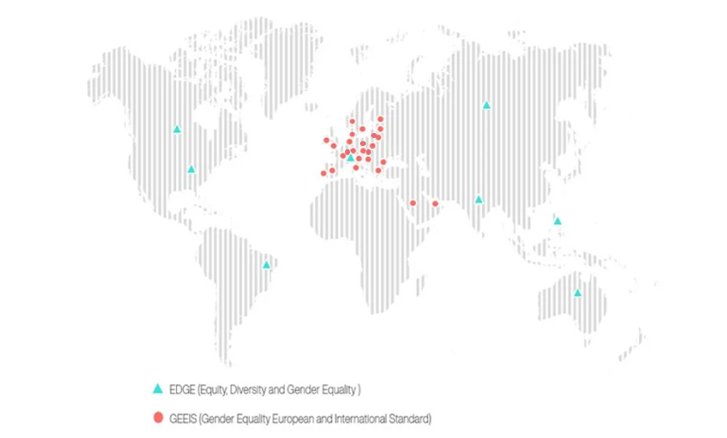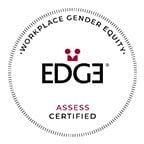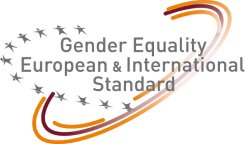Key Figures
Measuring our commitment to Diversity, Equity & Inclusion
Gender Equity
Women in management Women in governance

1 Strategic positions, including the Executive Committee (around 300 positions).
2 These are the positions with the greatest responsibility: strategic positions, key positions monitored at Group level and key positions monitored at the local/regional level. These positions represent 6.5% of Group employees as of 31 December 2023.
3 In 2023, 68% of recruits (permanent contracts) were women.
4 Excluding Board Members representing employees.
Women career development

Gender pay gap analysis in France
Since 2007, L'Oréal has called upon the Economix Institute that groups together renowned public research entities (INED, CNRS and Université Paris Nanterre), to conduct an annual gender pay gap analysis in France. The analysis has focused on median, mean and adjusted mean pay gap between men and women.
Evolution of the median gender pay gap*

*assessed by L’Oréal as a reliable and stable measure of central tendency
Evolution of the average/mean gender pay gap

*including Executive Committee (5% without in 2023)
Analysis of average/mean gender pay gap
The "average" or "mean" pay gap for 2023 was 8% in favor of men (23% for Top Executives, 6% for Senior Management, 4% for Middle Management, 1% for Professional and -5% for Support).
The "adjusted" average pay gap, once structural effects are taken into account (all things equal), is reduced to 2%. The structural effects considered are, for example, level of responsibility, age and seniority.
Parental Leave
14 weeks
minimum of paid leave for mothers / primary parents
6 weeks
minimum of paid leave for other new parent (fathers and co-parents)

Gender Equity Certifications
(35 countries)
For several years L'Oréal has put in place an ambitious policy on gender equity. In order to measure and assess its practices and policies, L’Oréal relies on two independant standards: Equity, Diversity and Gender Equality Certification (EDGE) and Gender Equality European & International Standard (GEEIS). In 2023, 35 pays have received the EDGE or GEEIS certification, which represents more than 60 % of the Group’s workforce.


Australia, Brazil, Canada, USA, India, Russia, Philippines, Switzerland |

Austria, Belgium, Bulgaria, Croatia, Czech Republic, Denmark, Estonia, Finland, France, Germany, Hungary, Ireland, Italy, Latvia, Lithuania, Netherlands, Norway, Poland, Portugal, Romania, Saudi Arabia, Slovakia, Slovenia, Spain, Sweden, United Arab Emirates, UK |
Disability
L'Oréal employees worldwide with disabilities
1,701
Total L’Oréal employees with disabilities* as at 31st December 2023
(*Direct employment)
Focus on France - direct employment of people with disabilities
in 2010
in 2023
Nationality & Multicultural Origins
167
nationalities across 64 countries
Global figures regarding the Multicultural Origins of our employees are not available. Aligned with UN recommendations, each country investigating ethnic characteristics of its population must carefully define terms such as “race”, “origin” or “tribe” which may have differing connotations. By nature of the topic, categories and their definitions will vary widely from country to country; therefore no internationally accepted criteria are possible.
Age & Generations
38
Average age of our employees
15%
of our employees aged 50 years old and over
25,000
professional opportunities for people under 30 in 2023
Inclusive Sourcing with suppliers
L’Oréal’s global Inclusive Sourcing programme, launched in 2010, harnesses the Group’s purchasing power to promote social inclusion. L’Oréal allocates part of its total purchasing volume to suppliers that provide employment and a sustainable income to people who are generally excluded from the labour market. Through the programme, L’Oréal has commitments it shares with its suppliers that relate to the four pillars of the Group’s Diversity, Equity & Inclusion policy.
Projects linked to Women's economic empowerment
beneficiaries of projects specifically related to the emancipation of women
of beneficiaries of overall Inclusive Sourcing program are women
encompassing 230 local initiatives in
38 countries
women producers harvesting and cultivating natural raw materials through fair sourcing
beneficiaries working in women – owned certified companies
LGBTQIA+ inclusion with our suppliers
people employed full-time via suppliers who are certified LGBTQIA+-owned companies in the USA
Employment of people with disabilities
people with disabilities working for our suppliers
over the last 3 years
beneficiaries with disabilities are based in France
worldwide encompassing
190 local initiatives
in 36 countries
with 171 suppliers
Inclusion of people of all ages
people hired over the age of 50 working for our suppliers
Including people of all socio-economic and multicultural origins
beneficiaries of Fair Sourcing projects (1/2 with women empowerment), for example in Burkina Faso, Madagascar, Thailand, India, Brazil, Mexico, Guatemala
full time jobs supported in classified rural and urban socio-economic vulnerable zones (such as ZRR and QPV in France, Distressed Zones in the USA, aspirational districts in India)
full time jobs supported for minorities, through equal opportunities practices (mainly in South Africa and the US) and also 390 jobs supported at minority-Owned certified companies in the US.
full time jobs supported for veterans or at veteran-owned certified suppliers
full time jobs for long-term unemployed people and workers in work integration social enterprises (WISE)
full time jobs supported for refugees

Previous Publications